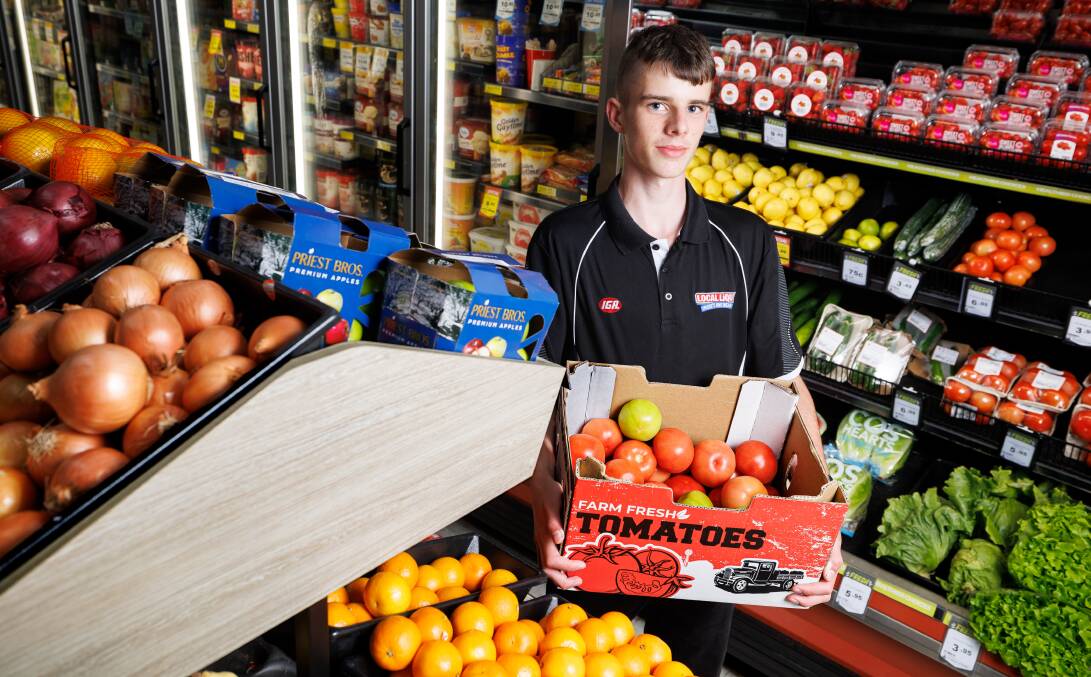Independent retailers in the ACT are seeking a level playing field with the "big boys" in what they call a "David and Goliath" supermarket battle, while also saying smaller suburban villages in Canberra are crying out for revitalisation.
It comes in the wake of one of the first federal moves on Australia's supermarket duopoly of Woolworths and Coles, with the interim report on the grocery code of conduct recommending the big players face fines that run into billions if they fail to give a "fair go" to farmers, suppliers and consumers.
While Anthony Albanese immediately insisted he was confident the changes recommended by former Labor minister Craig Emerson would "absolutely" lead to a drop in prices at the checkout, Peter Dutton cast doubt on the proposals being cost-of-living relief, insisting it was a predetermined "Mickey Mouse review by a Labor mate".

John Tourloukis, who owns the IGA at Holt, said there was no level playing field and smaller players were feeling the pinch.
"When it's a sort of David and Goliath type of thing, the favour is always with Goliath," the independent grocer told The Canberra Times.
"As suppliers, as distributors, and this and that you want to maximise your turnover, so you go to the big boys. And the bigger the boys are, the more hooks I suppose they have in it.
"You actually pay for lines going into the warehouse. You pay for what part of the shelving it's at. So everything's bought. Even displays and that. Companies have to pay for them. So that adds to the cost of goods."
The Albanese government has given in-principle support to recommendations that may include fines of up to $5.2 billion based on 10 per cent of annual turnover. Dr Emerson explained that would be for proven and substantial egregious behaviour.
The Emerson review did not back the various calls by the Nationals, The Greens and independent MPs such as Andrew Wilkie and Bob Katter for new powers to break up the giants. Treasurer Jim Chalmers flagged he would announce "very substantial changes to the mergers regime" later this week.
Mr Tourloukis welcomed the prospect of a heavy-stick approach.
"There's got to be some consequence. Obviously the heavier the fines, the better it is," he said.

Dimitri Mihailakis, a co-manager at Ainslie IGA, is also on board. He said he had seen really good Australian producers fold after trying to expand and being locked into contracts with big players they can't commit to, whether it be over weather or anything else. There was a great fear of retaliation in the market.
"Any sort of sanctions that can be put on the big guys from hurting farmers and small distributors and small producers is a good thing," he said.
"We just focus on quality of products, quality of range, and then be as competitive on pricing as we can be."
Mr Mihailakis was concerned tough sanctions may push up prices.
"I think if sanctions are being put on the big guys as far as how they're treating their suppliers, the prices at the big players will probably go up," he said.
"I can't imagine them paying their suppliers more and then absorbing the difference. The person who's going to end up paying for it will be the consumer."
That has been backed by a roundly dismissive Opposition Leader.
"I think this is a Mickey Mouse review that's been conducted by a Labor mate with an outcome predetermined by the Treasurer," Mr Dutton said.
But the Prime Minister expected prices to go down. Assistant Minister for Competition Andrew Leigh said it was all part of a suite of measures.
"Quarterly price monitoring from Choice which is now in the field and reporting back around the end of June. And also the ACCC inquiry which we'll look at things like loyalty schemes, and make sure that supermarkets are doing the right thing by consumers," Dr Leigh told The Canberra Times.
"Craig will look at the specifics [of the proposed sanctions] and how they might apply in the food and grocery context."

A spokesperson for Coles said the company remained "committed to the objectives of the code in delivering value to our customers while maintaining strong, collaborative relationships with our valued suppliers".
"We support a mandatory code and would welcome the extension to other large companies that supply grocery products. We will continue to work constructively as part of this review process," a Coles statement read.
Woolworths said it also supported the code becoming mandatory and wanted it expanded to include players such as Amazon, Costco, Bunnings and Chemist Warehouse. It pointed to internal work it has done, including establishing a dedicated team to support small suppliers when they start a "daunting" relationship with the company.
"We will consider the interim report in detail and we remain committed to continuing to engage constructively with Dr Emerson and the Review," a Woolworths statement read.
Mr Tourloukis wanted the field opened up in Canberra.
"It seems every time there's a block for a supermarket, it's for a big Coles or Woolworths. And that really seems to drag on the smaller people," he said.
"It's the accessibility of new stores. I think in Wright, where the developer put a Woolworths in there, it doesn't give the independent a chance to go in and buy the store."
He said there was a need for revitalisation in established suburbs.
"A lot of them haven't really moved on because I don't know whether it is mismanagement or there's not enough money in the stores," Mr Tourloukis said.
"Like your Duffys your Holders, where the shopping centres used to be vibrant, right now they are not.
"My mum still lives in Fisher, where are they spending their grocery money?"
The Canberra Times sought comment from the ACT government, but did not get a response before deadline.







